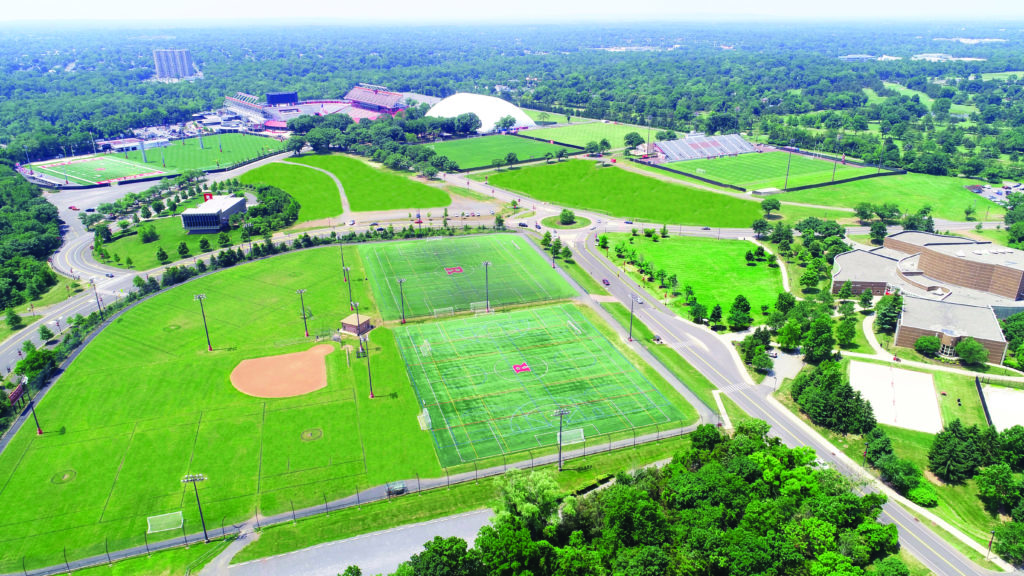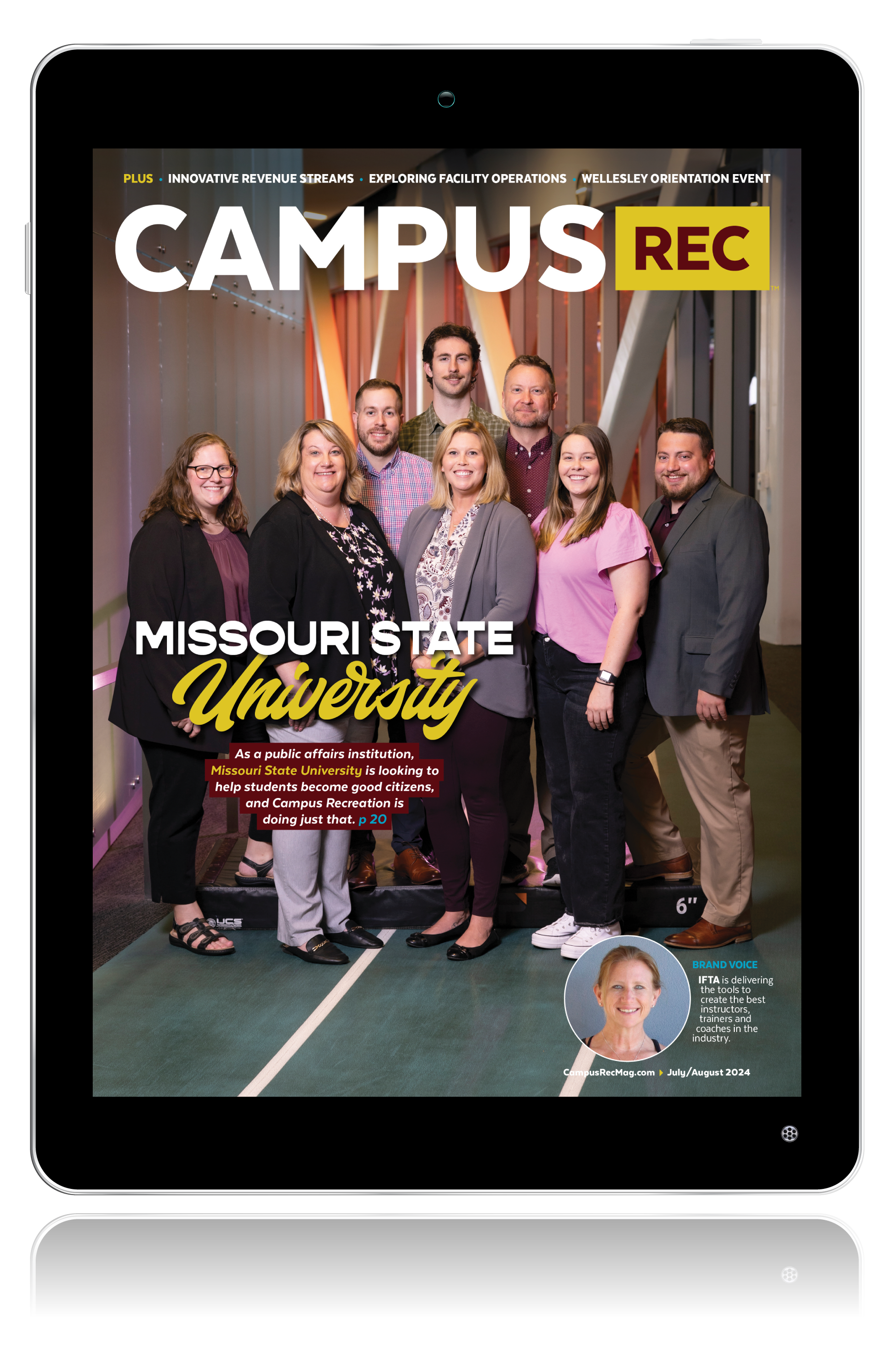No one ever thinks about it until it causes trouble, but the condition of your intramural fields is important to students’ recreational experience. Most of the focus in intramural programming is dedicated to equipment and marketing, but upkeep of the fields is just as important.
“Everyone wants to play on well-groomed fields,” said Dave Williams, the executive director of recreation at Rutgers University. “Well-kept fields limit injuries and enhance playing ability. They also increase revenue potential, add to the aesthetics of the university and help in recruiting students.”
Keeping intramural fields in good shape is important on college campuses of all sizes, from schools of roughly 30,000 students like Rutgers and the University of Wisconsin-Madison, to those with around 16,000 students like Missouri State University.
“Maintaining fields in excellent condition is necessary to manage risk,” said Cindi Barnett, the director of campus recreation at Missouri State. “Worn out artificial turf, holes and dips in the playing surface, rocks, and broken equipment can pose risk of injury to patrons.”
According to Lauren Easter, the assistant director of campus recreation and recreational sports at Missouri State, a great experience for students is the primary purpose of well-kept intramural fields.
“Our desire is to provide a great experience for patrons, and that’s hard to do when nets have holes or equipment is completely out of order,” said Easter. “Well-kept fields help with customer service, and ultimately may lessen or even prevent injuries.”
This sentiment is echoed by Brian McGuire, the building and grounds superintendent in the division of recreational sports at Wisconsin-Madison. “We want our users to have the best experience possible,” he said. “My staff and I take pride in the work we do, so when our fields look great and we get compliments, it’s a good feeling.”
Think of your intramural fields as pieces of equipment. Like a treadmill, a field needs to be cleaned, maintained and eventually replaced. And when you provide the highest quality equipment and amenities in your rec programs, students will take notice.
To help give your students their best intramural experience, follow some of these tips for keeping your intramural fields in great shape:
Field Grooming
At Missouri State, upkeep of intramural fields starts with basic grooming. “One of our best practices is maintaining well-groomed fields and the surrounding grounds for safety,” said Barnett.
Grooming doesn’t necessarily mean heavy amounts of yard work, but rather basic cleaning, weeding or mowing only in spots that require immediate attention.
“We monitor our artificial turf, and clean and groom our regular fields only as needed,” said McGuire. “Over-grooming will reduce the lifespan of the field.”
Another way to increase the lifespan of your intramural fields, according to Williams, is to regularly perform quality tests on them. “Some of the best practices for our three turf fields are a three-year creaser replacement, annual impact test and quarterly field grooming,” said Williams.
Equipment Maintenance
Your intramural fields can be considered equipment, but you also need to use conventional equipment to maintain those fields, so it’s important to keep that equipment in good shape.
“We take excellent care of all our equipment, from shop tools to mowers, utility vehicles and trucks,” said McGuire. “We regularly perform preventive maintenance and keep them clean — this reduces unforeseen breakdowns that limit our ability to provide the best fields and facilities.”
According to Barnett, consistently inspecting your equipment will help prolong its lifespan. “Keep field equipment — goals, nets, storage facilities and restrooms — in good repair with regular inspections,” she said.
Ground Keeping
Beyond preliminary grooming, your staff needs to be performing regular “deep cleanings” of your intramural fields. This includes weeding, mowing and other ground keeping tasks.

“All the top dressing, weeding, feeding, mowing and lining are all handled externally through the university’s facilities landscape department,” said Williams. “This work is completed to our department’s standards.”
Wisconsin-Madison also keeps its intramural fields in top condition. “We keep up a regular schedule of mowing, reseeding, fertilizing, watering and weed control for our regular fields,” said McGuire.
However, if you get tired of monitoring all the mowing, weeding and other yardwork for your fields, you might consider replacing at least one field with an artificial turf field. Making the switch will end up making maintenance more convenient.
“If you currently have grass fields, find a way to get artificial turf fields,” said Galen Martin, the associate director of campus recreation at Missouri State. “There is a lot less maintenance involved and they will save you money over time.”
Rotating Schedule
Another proven method for improving the quality of your intramural fields is reducing overuse, which can be accomplished with a staggered schedule of events.
“We use a rotation of our sports and activities to not cause excessive wear and tear to a single area,” said McGuire. “On our grass fields, we restrict usage during wet or muddy conditions.”
Putting fields through consecutive games too often can cause significant, lasting damage. Give each of your fields plenty of time to recover in between games and events.
“Our game schedule is limited to allow fields to adequately recover,” said Williams. “We also alternate the fields we use as necessary before they begin to show wear and tear.”
Cleanup
No one wants to play on a trashy field — this can be taken literally. Keeping your intramural fields free of trash and other debris can be just as important as making sure the grass is full and green.
It seems like a menial task, but picking up trash should be a regular practice. “We check our fields daily for trash or any damage that may need immediate attention,” said McGuire.
And cleanliness isn’t limited to the actual fields. The surrounding area of your intramural fields will also benefit from regular cleaning and maintenance.
“Keep your facilities — including restrooms, drinking fountains, storage buildings and concessions — clean and well-lit,” said Barnett. “Also, keep trash removed daily — clean and well-maintained facilities are inviting and welcoming to students.”
Security
When you have scheduled events, you love seeing people on the fields. In the middle of the night, with the lights off, however, this is the last thing you want to see. Security is important to minimizing non-sports related damage to your intramural fields.
“We enforce certain rules on our fields: no bikes, vehicles, pets, food, sunflowers or anything else that hurts the fields,” said McGuire. “This helps prevent any damage caused by these activities.”
It seems obvious, but a simple yet effective deterrent is a tall, chain-link fence. And if you can afford it, a visible security camera will help prevent harm to the fields. “Secure your fields to assist in the prevention of vandalism from the general public,” said Barnett.
According to Williams, however, security has become a challenge at Rutgers due to the sheer amount of space in the intramural fields area. “Our expansive campus geography, open campus, limited fences, access control and signage do make it difficult to keep the general public off the fields when they aren’t in use,” said Williams.
Challenges
Maintaining great intramural fields isn’t all fun in the sun, especially when the sun isn’t out. “The weather is our biggest challenge,” said McGuire. “You can’t plan or predict the weather, and most of our field maintenance requires good weather.”
It’s hard to host games and events on your intramural fields when the rain is coming down, making it equally difficult to perform maintenance tasks when the weather isn’t cooperating.
The weather isn’t the only challenge campus rec professionals have encountered, however. Maintenance schedules have been known to cause problems, especially if a department outside campus recreation handles maintenance.
“If you rely on other departments to assist with maintaining your fields, communicate your needs well in advance,” said Barnett. “It’s important to be proactive by making regular inspections and submitting work orders promptly, so repairs or maintenance will be completed well before the required date.”
The campus rec department at Rutgers has encountered this same problem, according to Williams. “Since our grass fields are maintained by our facilities landscape department, they may not always adhere to our timeline,” he said.
Great Fields are Worth It
“Visually appealing, well-maintained fields are more inviting to patrons,” said Barnett. “If the fields are in disrepair, dirty or unsafe, patrons will go elsewhere.”
They may not seem like as big a deal as the games being played or equipment used, but fields that look great are a great tool for recruiting and retention for your rec center.
“When the fields are in great condition, the players enjoy the game more and have a better experience,” said McGuire. “This results in a positive influence on players, who then encourage others to use our facilities, thus increasing participation in all sports and activities.”










